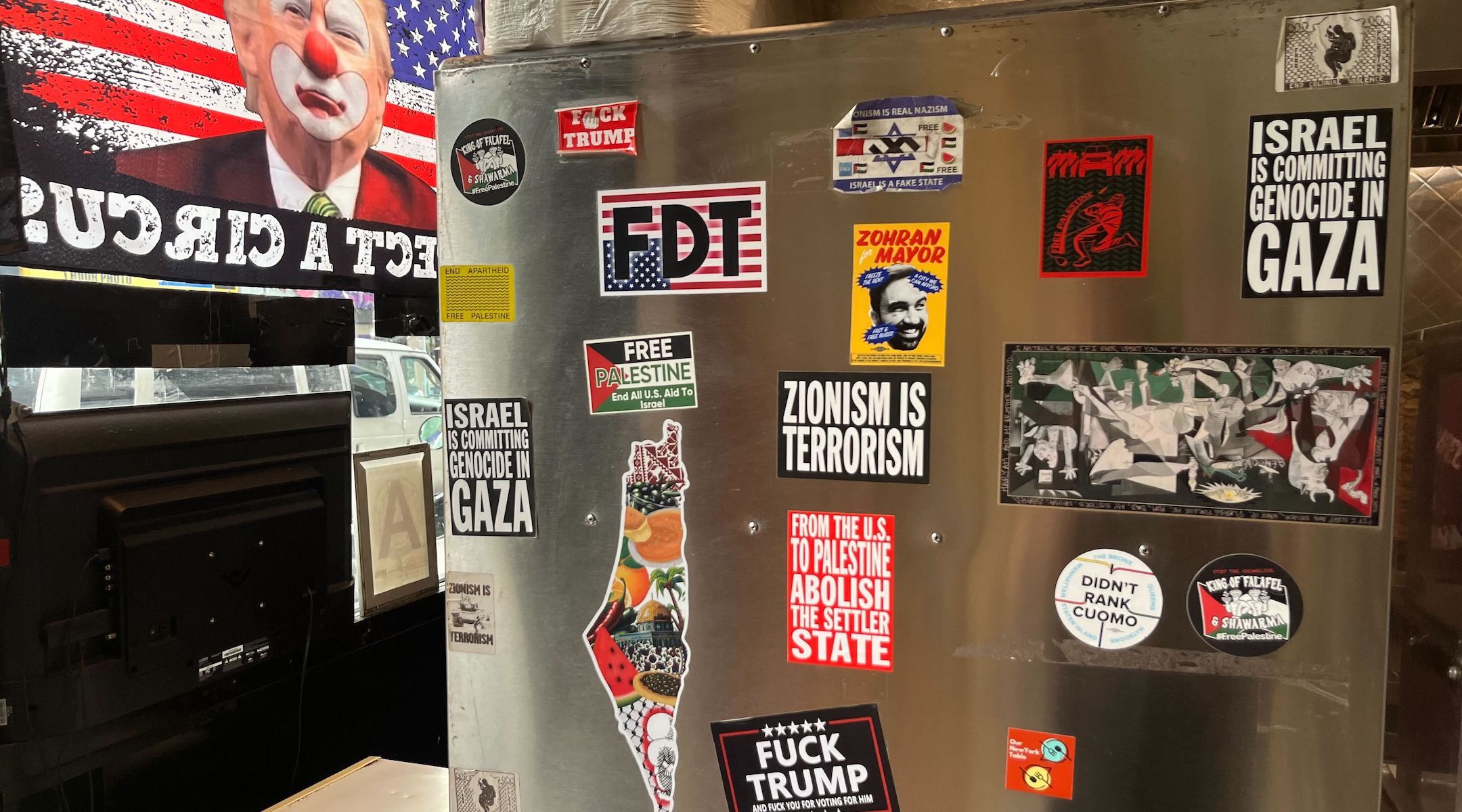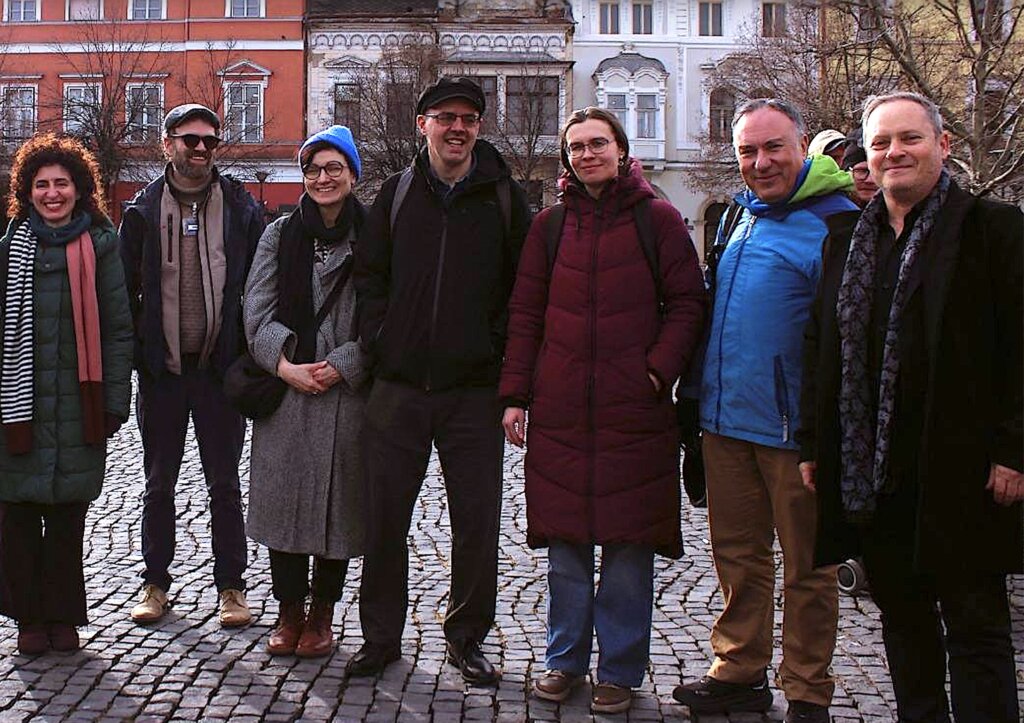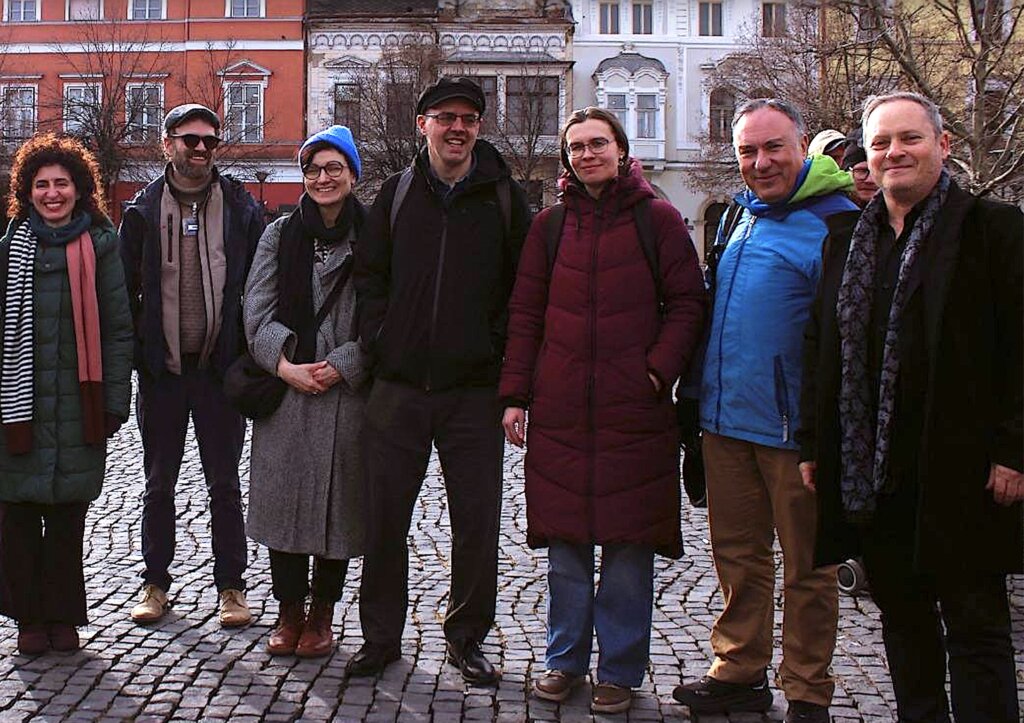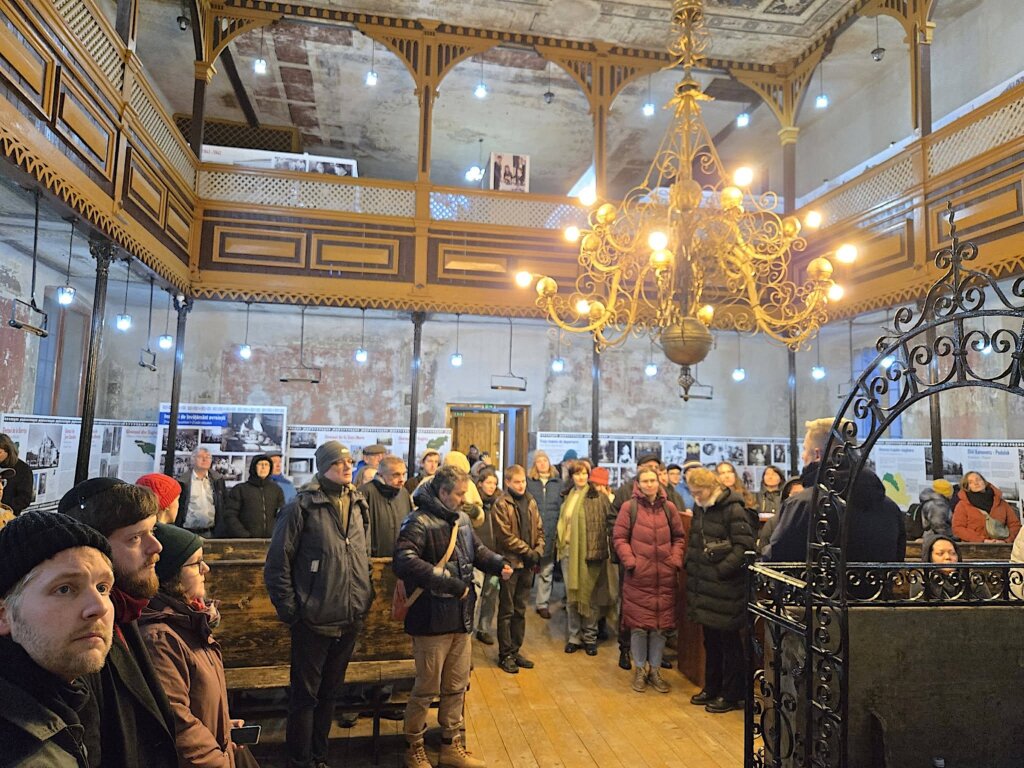Uncategorized
We’re Jews in Zohran Mamdani’s neighborhood. You don’t want NYC to be like this.

(JTA) — The excitement in the air is palpable as our neighborhood turns out for Zohran Mamdani. In many ways, we know him well: he’s been our assemblyman for the last four years. In any other world, we would be excited by the possibility of a man like Zohran — an eloquent speaker, attuned to the affordability crisis, relatable despite his family wealth, a first-name figure in the community — rising up to challenge the establishment.
But that is not our portion. As Jews of District 36, Zohran’s Assembly district, we live in a world where his tenure and campaign have fragmented our community, fractured our trust in each other, and upended our sense of belonging and safety. We are left-wing Jews, right-wing Jews, and out-of-the-box Jews who want nothing more than to focus on the kinds of policy questions that affect our material conditions as New Yorkers.
But our experience in our neighborhood has torn us away from everyday concerns like making the rent and paying for groceries. That’s because the vision that Zohran said drew him to the Democratic Socialists of America five years ago — a stance on Palestine that calls for the isolation of Zionists, rejects “normalization” or relationships between anti-Zionists and supporters of Israel, and sanctions armed violence — has shaped what it’s like to live here since Oct. 7, 2023.
We go to different synagogues, work in different fields, and have different Jewish backgrounds. But when we came together as friends and neighbors in a local WhatsApp group for Astoria Jews in the aftermath of Oct. 7, we learned we had a common experience — one that we unfortunately shared with others in our neighborhood’s diverse Jewish community. Here, with the collective input of local Jews — religious and irreligious, queer and traditional, Mizrahi, Sephardi and Ashkenazi — we explain why our objections to a Mayor Mamdani are rooted not in abstract fear or deep-seated bias, but the product of daily life in a community shaped by Zohran’s public political choices.
On Oct. 8, 2023, just hours after the Hamas attack in Israel, Mamdani opted for a political statement of blame, rather than words of comfort and care so desperately needed by his own constituents. Since then, we’ve seen graffiti reading “Long Live Hamas,” “Sinwar Lives,” “Kill Yourself Zionist,” and Hamas red triangles spray-painted on residential buildings and businesses. Flyers attacking “Zionist capital” were distributed during a local rezoning debate, and people waving Hamas flags have rallied in our streets.
At a holiday block party, a mother was called a “genocidal killer” in front of her preschool-aged children; another was called a “bitch” by a man miming throat-slitting while she scraped graffiti from a lamp post. At a neighborhood bar’s karaoke night, a man sang “Deutschland über alles” while giving a Nazi salute. Posters and stickers with keffiyehs and machine guns have regularly appeared near playgrounds and public spaces.
https://www.instagram.com/p/DLFoxarM7hk/?img_index=4&igsh=ZXpramplczlpeDNm
Our teens have skipped school on cultural appreciation days to avoid being ostracized, and our hearts have shattered as our children reassure us of their safety with phrases like “don’t worry, no one knows I’m Jewish.” Signs that welcome the stranger, the immigrant — a longstanding Jewish value immortalized in verse by the Jewish-American poet Emma Lazarus — now live alongside swastikas and hate-speech on lampposts and shop windows across the district.
What we haven’t seen is any meaningful response to just how normal this has become. When a local business hung a massive, blinking “Fuck Israel” sign alongside a portrait of Hitler, we spoke up at our community board meeting in front of a silent Mamdani representative, to no response. We have filed complaints, we’ve removed stickers, we’ve spray-painted over violent imagery — and we’ve been at it alone. This is not the New York we want to live in, and this is not the New York of equality, safety and inclusivity that Zohran is promising.
In a city as diverse as New York, where nearly 40% of residents are immigrants and many more are part of transnational or multicultural communities, Jewish New Yorkers are not unique in carrying layered identities. The 80% of American Jews that consider Israel to be an “essential or important component” of their identity, are mirrored by Indian, Korean and Dominican Americans who feel the same connection to their homeland. What is unique, and unacceptable, is being sent the message that this connection is somehow at odds with our identity as New Yorkers.
This election is not a referendum on Israel or the place of Jews in New York City. It is, more pointedly, a reflection of a referendum that has already taken place; one that shaped the culture in which Zohran was raised as a cosmopolitan scion of the academic and cultural elite, with access to some of the best resources this city has to offer.
These resources — private grammar schools, specialized high schools, wealthy neighborhoods, the glitter- and literati — hold hints of old-boys-club antisemitism filtered through the lens of new-age anti-Zionism. Left unquestioned, they lay the foundation for an unrecognizable New York. When 54% of all hate crimes last year targeted Jews, we would argue we are already halfway there.
When we heard Zohran describe the fear of his Muslim family members in the aftermath of 9/11, we wondered why he can’t see the fear of most Jewish New Yorkers today.
We took notice when he said, as he was reported as saying in Brooklyn, that he would be here for us “when the mezuzah falls.” We want to be clear: a mezuzah doesn’t fall. A mezuzah is taken down discreetly while the streets echo with calls to globalize the intifada. It is kissed one last time, while the memory of being called a genocide lover in front of your children infuses the parchment. It is wrapped and placed in a box alongside other whispering mementos from grandparents who survived Iraq, Morocco, Poland, France, Uzbekistan, as we wonder if its hum has gotten loud enough for us to listen and know that the time to leave has come once more.
Our pain and fears are real and valid; the frustrations on all sides of the Jewish spectrum come from a shared concern for the wellbeing of our city and all of humanity. In our synagogues, alongside the prayer for Israel, we say the prayer for our country and wish wisdom upon its leaders, just as Jews have wished upon the leaders of every Diaspora nation where we have lived.
Our history has taken us, the Jewish people, through many lands, from our origins as a people called Israel in the Levant through thousands of years of exile, transfer and return. Today, just over a million of us — still that same people — are proud to call New York City home, and we want to keep calling this city home. We have given deeply to this place, pouring in whatever we had in every generation: labor, culture, protest, philanthropy, policy, innovation. So, too, have we been nourished by this city.
We love New York. We want to stay, not in silence, not on sufferance, but fully and without fear. We wonder if that is possible in a city led by Zohran Mamdani.
The views and opinions expressed in this article are those of the author and do not necessarily reflect the views of JTA or its parent company, 70 Faces Media.
The post We’re Jews in Zohran Mamdani’s neighborhood. You don’t want NYC to be like this. appeared first on The Forward.
Uncategorized
A ‘Yiddish Vokh’ for nerds — but without the families

דעם 9טן ביזן 16טן פֿעברואַר איז אין קלויזנבורג, רומעניע פֿאָרגעקומען די ערשטע אינטענסיווע ייִדישע ווינטער־פּראָגראַם געווידמעט דער טעמע ייִדיש אין געוועזענעם מיזרח־בלאָק, ד״ה אין ראַטן־פֿאַרבאַנד, פּוילן, און רומעניע אין דער קאָמוניסטישער תּקופֿה. אַן אינטענסיווע ייִדיש־פּראָגראַם מיט אַזאַ טעמע, וווּ מע לערנט סאָוועטיש ייִדיש און אָרטאָגראַפֿיע, איז נאָך קיין מאָל נישט געווען, אויף וויפֿל איך ווייס — לכל־הפּחות נישט זײַט דער ראַטן־פֿאַרבאַנד האָט צוגעמאַכט דאָס געשעפֿט אין 1991.
איבער 70 ייִדישיסטן, ייִדיש־פֿאָרשערס און אַוואַנסירטע סטודענטן האָבן זיך פֿאַרזאַמלט אויפֿן קאַמפּוס פֿון באַבש־באָלײַ־אוניווערסיטעט, וואָס איז דער גרעסטער אין רומעניע און דער איינציקער, וווּ מע לערנט ייִדיש. די פּראָגראַם איז באַשטאַנען פֿון לעקציעס, וואַרשטאַטן, קאָנצערטן, וויזיטן אין מוזייען און בתּי־כּנסיות, אַ נסיעה קיין סאַטמאַר און שאַמלוי, ווי אויך אַן אַקאַדעמישע קאָנפֿערענץ מיט 12 רעפֿעראַטן — אַלץ אין גאַנצן אויף ייִדיש.
מע קען זאָגן, אַז די אונטערנעמונג איז געווען אַ מין „ייִדיש־וואָך“ פֿאַר נערדס — אָבער אָן די משפּחות.
די באַטייליקטע זענען געקומען פֿון אַ סך אייראָפּעיִשע לענדער, צפֿון־אַמעריקע און ישׂראל. דער פּוילישער קאָנטינגענט איז געווען ספּעציעל אָנזעעוודיק (כּן ירבו!). איך האָב באַמערקט, אַז אַפֿילו צווישן די אַמעריקאַנער און ישׂראלים האָבן אַ סך מענטשן געהאַט אַ „סאָוועטישן“ הינטערגרונט, ווײַל זייערע טאַטע־מאַמע זענען געקומען פֿון דאָרט. אין אַ געוויסער מאָס איז די פּראָגראַם געווען אַ סאָרט צוזאַמענטרעף פֿון לאַנדסלײַט.
ווי אַזוי האָט מען צוגעצויגן איבער 70 ייִדישיסטן קיין קלויזנבורג, רומעניע? קודם־כּל, איז די פּראָגראַם געווען כּמעט בחינם. מע האָט באַצאָלט בלויז $10 אַ האָטעל־צימער און זייער ווייניק פֿאַר אַן עקסקורסיע און אַנדערע קלייניקייטן, אָבער בעצם איז עס געווען פֿרײַ, אַ דאַנק די צוויי אוניווערסיטעטן, וואָס האָבן אָרגאַניזירט די פּראָגראַם בשותּפֿות: בר־אילן אוניווערסיטעט אין ישׂראל און באַבש־באָלײַ־אוניווערסיטעט אין רומעניע.
זיי האָבן, למשל, געדעקט כּמעט אַלע הוצאָות און באַזאָרגט די באַטייליקטע מיט קאַווע און כּיבוד אין די הפֿסקות. בכלל קאָסט דאָס לעבן אין רומעניע ווייניקער ווי אין מערבֿ־אייראָפּע אָדער אין ישׂראל. האָבן די אָנטייל־נעמער געלעבט אַזוי ווי אינעם באַקאַנטן ליד „רומעניע“ פֿון אַהרן לעבעדעוו: „פֿון קיין דאגות ווייסט מען ניט…“

דעם פּלאַן פֿאַר דער בשותּפֿותדיקער פּראָגראַם האָט בער קאָטלערמאַן אויסגעאַרבעט צוזאַמען מיט אַוגוסטאַ קאָסטיוק ראַדאָסטאַוו. געהאָלפֿן אָרגאַניזירן האָבן אויך ענת אַדרת און חנה גינזבורג־פּאַלעי, ווי אויך פֿיליפּ שוואַרץ. אין דער פּראָגראַם האָבן אויך געלערנט דאַשאַ וואַכרושאָוואַ, מיכאל לוקין, סאַשאַ פּאָליאַן, קאַראָלינע שימאַניאַק און אַני הקטן.
ס׳איז געווען צו באַוווּנדערן, אַז די גאַנצע פּראָגראַם איז פֿאָרגעקומען אין גאַנצן אויף ייִדיש, אַפֿילו לעקציעס וועגן שווערע ליטעראַרישע און היסטאָרישע טעמעס. דאָס איז בלויז געווען מעגלעך דערפֿאַר, ווײַל די פּראָגראַם איז געווען געצילט, דער עיקר, אויף אַוואַנסירטע ייִדיש־קענערס. מע האָט אויך אַרײַנגענומען מיטעלע סטודענטן, אָבער נישט קיין אָנהייבערס. דאָס האָט אַלעמען באַפֿרײַט פֿון דער געוויינטלעכער טירחה פֿון באַפֿרידיקן די אָנהייבערס מיט ענגליש־שפּראַכיקע לעקציעס, אונטערנעמונגען, און דערקלערונגען. מע האָט יאָ פֿון צײַט צו צײַט געהערט גוייִשע שפּראַכן, ווי למשל ווען מענטשן פֿון דעם זעלבן לאַנד האָבן גערעדט צווישן זיך. אָבער בדרך־כּלל האָבן אַלע פּראָבירט צו רעדן בלויז ייִדיש.
פֿון די 1920ער ביז די 1940ער יאָרן האָבן ייִדישע קאָמוניסטן געשאַפֿן אַ וויכטיקן חלק פֿון דער ייִדישער קולטור און ליטעראַטור. אַ סך פֿון די בעסטע ייִדישע שרײַבערס זענען געווען קאָמוניסטן, אָדער האָבן לכל־הפּחות סימפּאַטיזירט מיט זיי און געשריבן פֿאַר „לינקע“ פּובליקאַציעס. עס איז אַן אומיושר, וואָס דער הײַנטיקער עולם פֿאַרקוקט די קינסטלערישע אויפֿטוען פֿון די קאָמוניסטן בלויז דערפֿאַר וואָס זיי זענען געווען שטאַרק נאַיִוו און זענען אַרײַנגעפֿאַלן אין אַ פּאַסטקע. די טראַגעדיע פֿונעם 12טן אויגוסט 1952, ווען דער רעזשים האָט דערמאָרדעט וויכטיקע סאָוועטשע שרײַבערס און קולטור־טוערס, האָט געוואָרפֿן אַ שאָטן אויף דער גאַנצער תּקופֿה — אָבער די ייִדישע שרײַבער האָבן דאָס נישט פֿאַרדינט.
איין פּראָבלעם מיט דער קאָנפֿערענץ איז געווען וואָס געוויסע אַקאַדעמישע לעקציעס האָבן געדויערט 90 מינוט. דאָס איז געווען ניט גרינג אַפֿילו פֿאַר אַוואַנסירטע סטודענטן. צוריקגערעדט, וואָס איז דאָ ייִדיש ערגער פון אַנדערע שפּראַכן, אויף וועלכע מע האַלט אַקאַדעמישע לעקציעס?
אַ טשיקאַווער צוגאָב צו דער פּראָגראַם איז געווען אַ קורצער פֿילם אויף ייִדיש געשאַפֿן פֿון עטל ניבאָרסקי, פֿאַרבונדן מיט די סאָוועטיש־ייִדישע שרײַבערס. עס איז אַ שיין ראָמאַנטיש בילד — אָבער איך וויל נישט אויסזאָגן קיין סודות, ווײַל יעדער איינער דאַרף זען דעם פֿילם פֿאַר זיך אַליין.
בײַ די מערסטע באַטייליקטע איז דאָס געווען דאָס ערשטע מאָל וואָס זיי זענען געקומען קיין קלויזנבורג. זי איז אַ שיינע אַלטע שטאָט מיט אַ סך פּרעכטיקע גאַסן און הײַזער פֿון די עסטרײַך־אונגערישע צײַטן. ס׳איז די צווייט־גרעסטע שטאָט אין רומעניע און האָט אַ סך גוטע רעסטאָראַנען און קאַווע־הײַזער, וווּ מע קען פֿאַרברענגען די איבעריקע שעהען.
כאָטש רומעניע האָט פֿאַר דער צווייטער וועלט־מלחמה זיך נישט גערעכנט פֿאַר קיין גרויסן ייִדיש־צענטער, זעען מיר הײַנט אײַן, אַז זי האָט געהאַט אַ חשובֿ אָרט. ערשטנס, האָבן מער ייִדן איבערגעלעבט די מלחמה אין רומעניע ווי אין פּוילן, ליטע אָדער אונגערן, ווײַל רומעניע האָט נישט דעפּאָרטירט אירע ייִדן קיין אוישוויץ. (אין קלויזנבורג האָט מען זיי יאָ דעפּאָרטירט, ווײַל די שטאָט האָט ווידער געהערט צו אונגערן צווישן 1940 און 1944.)
אַ סך ייִדן איבער דער וועלט שטאַמען פֿון רומעניע, אַרײַנגערעכנט באַקאַנטע חסידישע הויפֿן, ווי סאַטמאַר, וויזשניץ, קלויזנבורג, סקולען, ספּינקע און קרעטשניף. אַ טייל פֿון די חסידים האַלטן זיך פֿאַר „אונגערישע“ ווײַל אַ מאָל איז דאָס געווען אונגערן, אָבער לויט דער הײַנטיקער מאַפּע זענען זיי רומענישע. דער אונטערלענדישער דיאַלעקט, וואָס מע האָט גערעדט אין מערבֿ־רומעניע, איז דער יסוד פֿונעם חסידישן ייִדיש וואָס מע רעדט הײַנט.
דעם פֿאַרלעצטן טאָג האָט מען געמאַכט אַן עקסקורסיע קיין סאַטמאַר (Satu Mare), וואָס געפֿינט זיך נאָענט צו דער אונגערישער גרענעץ. איין באַטייליקטער, אַסף קירשנער, האָט באַמערקט: „דער בעסטער אופֿן זיך אויסצולערנען ייִדיש איז צו זיצן דרײַ שעה אין אַן אויטאָבוס קיין סאַטמאַר צוזאַמען מיט ייִדישיסטן, וואָס הערן נישט אויף צו רעדן.“ אין דער גרויסער שול פֿון סאַטמאַר האָבן מיר באַגעגנט אַ גרופּע סאַטמאַרער חסידים, געקומענע פֿון לאָנדאָן, וואָס האָבן געהאַלטן אין דאַווענען שחרית. פֿאַר די חסידים איז געווען אַ חידוש צו זען אַ גרופּע פֿון זיבעציק מענטשן, מענער און פֿרויען אָנגעטאָן ווי גויים, וואָס רעדן אַלע ייִדיש.
די איינציקע צרה איז געווען אַן ענין מיט דער באַהייצונג. דער עולם האָט געהערט עטלעכע לעקציעס אינעם אָרטיקן בית־מדרש, וואָס איז נישט געווען באַהייצט. האָבן אַלע שוין געטראָגן די מאַנטלען די גאַנצע צײַט.

מיר האָבן געזען די שטאָט סאַטמאַר מערסטנס דורכן פֿענצטער פֿון אויטאָבוס, ווײַל עס האָט די גאַנצע צײַט גערעגנט. אָבער דאָס באַגעגעניש מיט די סאַטמאַרער חסידים האָט זייער שיין אילוסטרירט אונדזער פּראָגראַם: אַ וואָך אין דער סאָוועטיש־ייִדישער אוטאָפּיע. (דאָס איז סײַ איראָניש געמיינט, סײַ נישט איראָניש.)
„דאָס איז געװען אַן אויסערגעװיינטלעכע אָקאַזיע צו פֿאַרברענגען מיט מענטשן פֿון דער גאָרער ייִדישער װעלט,“ האָט אַ באַטייליקטער, בנימין לערמאַן, פֿון בערקלי, קאַליפֿאָרניע, צוזאַמען מיט זײַן ברודער, עריק, מיר געשריבן אין אַ בליצבריוו. „כאָטש איך בין נישט קיין אַקאַדעמיקער און האָב פֿריִער נישט געהאַט קיין ספּעציעלן אינטערעס צו סאָװעטישע ענינים, איז דער אינהאַלט געװען אינטערעסאַנט און האָט אין מיר אָנגעצונדן אַ חשק װײַטער צו לייענען די סאָװעטישע שרײַבער.“
„מע האָט זיך אױפֿגעכאַפּט מיט ייִדיש, זיך געלייגט שלאָפֿן מיט ייִדיש, אַפֿילו געחלומט אױף ייִדיש,“ האָט געזאָגט אַ צווייטער באַטייליקטער, טאָמעק מײַטשאַק, פֿון וואַדאָוויצע, פּוילן. און תּפֿארת פֿרומקין, פֿון ירושלים, האָט אַפֿילו געזאָגט, אַז אויף דער פּראָגראַם איז זי געווען אַזוי אײַנגעטונקען אין ייִדיש, אַז נאָך דעם, אויפֿן פֿליפֿעלד, האָבן אַלע פֿרעמדע שפּראַכן איר געקלונגען ווי ייִדיש.
The post A ‘Yiddish Vokh’ for nerds — but without the families appeared first on The Forward.
Uncategorized
Trump’s Board of Peace convenes on Gaza as prospect of U.S. war with Iran surges
(JTA) — The Board of Peace convened by President Donald Trump to administer Gaza’s reconstruction is meeting for the first time in Washington, D.C., on Thursday.
At the same time, signs are mounting that Trump could launch a long-threatened war on Iran imminently, which would throw the Middle East back into turmoil. U.S. warships are amassing in the region, Israeli Prime Minister Benjamin Netanyahu canceled a planned trip to the United States this week and Trump met Wednesday with his top Iran advisors.
Trump surprised Israel by opening direct negotiations with Iran last year to limit its nuclear program. The ongoing talks, including this week, have reportedly left a wide gap in the two sides’ positions.
“There are many arguments one can make in favor of a strike against Iran,” White House Press Secretary Karoline Leavitt said on Wednesday while maintaining that Trump would still like to make a deal.
Israeli media is reporting that a war could begin as soon as this weekend; Axios is reporting that U.S. officials view the end of the month as a significant deadline before making a final decision.
Iranian officials have said they would consider all Israeli and U.S. positions as legitimate targets as they respond to any U.S. attack, meaning that Israelis could soon find themselves once again racing to bomb shelters with Iranian missiles incoming.
Unlike after last year’s U.S. strike on Iranian nuclear sites that brought to an end a 10-day war between Israel and Iran, any U.S. campaign against Iran now could last months, according to reports.
Trump and Vice President JD Vance are scheduled to address the Board of Peace directly. Netanyahu joined the board only reluctantly, citing misgivings about sharing membership with Qatari and Turkish leaders who have supported Hamas in Gaza.
The post Trump’s Board of Peace convenes on Gaza as prospect of U.S. war with Iran surges appeared first on The Forward.
Uncategorized
Tucker Carlson draws scorn for claiming he was ‘detained’ at Israeli airport after Mike Huckabee interview
(JTA) — Tucker Carlson had just barely wrapped his interview with U.S. Ambassador to Israel Mike Huckabee before the two were already disagreeing on a basic fact.
Carlson, the influential conservative commentator, flew to Tel Aviv on Wednesday to conduct the interview with Huckabee at Ben Gurion Airport, departing hours later without leaving the airport. But before leaving, he told the British tabloid Daily Mail, Israeli authorities confiscated his passport, dragged his executive producer into an interrogation room “and then demanded to know what we spoke to Ambassador Huckabee about.’
Not so, says the ambassador: What Carlson’s team experienced was simply a routine security measure.
“EVERYONE who comes in/out of Israel (every country for that matter) has passports checked & routinely asked security questions,” Huckabee wrote on X, refuting his former Fox News colleague before their conversation could go live.
Israel’s airport authority also denied the allegations, saying Carlson’s team “were politely asked a few routine questions, in accordance with standard procedures applied to many travelers.” A longer statement from the U.S. Embassy in Israel also said Carlson’s decision to stay in Israel only a few hours without leaving the airport was his alone.
Carlson’s complaints drew withering reactions from Jews and others who said they recognized the intense security practiced at Ben Gurion. The conservative commentator John Podhoretz, for example, recounted on X how he had been questioned for 20 minutes because he was couriering a dress for a relative. “I’ve known Tucker was an asshole for 30 years but this takes the f–king cake,” he wrote.
The back-and-forth was a preview of the hotly anticipated interview between the two divergent flanks of the Christian MAGA coalition, whose public disagreements on Israel have paralleled a larger fissure in the Republican party. Carlson, the influential GOP kingmaker, has increasingly embraced anti-Israel talking points on his show at the same time as he has platformed conspiracy theorists and antisemites including Nick Fuentes. A growing number of young right-wing influencers and candidates are lining up behind his views.
Huckabee, meanwhile, is a leading evangelical Christian Zionist who has argued in favor of Israeli sovereignty over the West Bank. He publicly lobbied Carlson for a sit-down after Carlson used his podcast to criticize him for what Carlson described as a failure to intervene in Israeli demonization of Christians. Carlson agreed to a talk, and posted a picture of himself arriving Wednesday prior to the interview.
“Greetings from Israel,” Carlson posted to X, captioning a photo of him posing outside near an Israeli flag with his arm around business partner Neil Patel. (“Sell out,” Sneako, a livestreamer and Internet personality with a long streak of antisemitic and anti-Israel comments, wrote in reply.)
Greetings from Israel. pic.twitter.com/1uBWvqBNST
— Tucker Carlson (@TuckerCarlson) February 18, 2026
To some seasoned travelers, the location was obvious.
“That’s the walkway to the private jet terminal for VIP entry,” tweeted David Friedman, who was U.S. ambassador to Israel during President Donald Trump’s first term.
“After the Western Wall, the Temple Mount, the City of David, the Church of the Holy Sepulcher, the Garden of Gethsemene, Capernaum, the Sea of Galilee, Nazareth, Bethlehem, Yad Vashem, the Knesset and about 2 million other places, this walkway is an important site (but only if you fly on private jets),” he continued. “Too bad Tucker stayed in the airport in the face of so many invitations to see so many wonderful places. A huge and obviously intentional missed opportunity.”
Trump, an ally of both Carlson and Huckabee, may have also played a hand in arranging the interview, according to a former Fox News reporter who told the Times of Israel that Trump wanted to prevent an intra-party spat over Israel that could benefit Democrats. The source, Melissa Francis, also described the interview as “emotional” and said Carlson’s team had tried and failed to also arrange an interview with Prime Minister Benjamin Netanyahu.
Little about the interview process had been straightforward. The week before Carlson touched down in Israel, according to local reports, Israeli authorities had indeed briefly discussed whether to bar Carlson from entering the country over his past comments — something they routinely do for non-Jewish critics of Israel, even for prominent figures. They ultimately decided to avoid a diplomatic incident, according to reports.
In the days since agreeing to an interview with Huckabee, Carlson has posted new interviews with Ryan Zink, a pardoned Jan. 6 rioter and Texas congressional candidate; billionaire hedge-fund manager Ray Dalio; conspiracy theorist Ian Carroll; and former U.S. Rep. Ron Paul.
Carlson has not yet published his interview with Huckabee. But late Wednesday, he shared an interview about Israel, continuing the vendetta that started their exchange. “How does Israel treat Christians? We spoke to one whose family has lived there since Jesus. His story is shocking,” Carlson wrote to promote the video.
For Carlson’s Jewish critics, the whole day offered yet more evidence that whatever he ultimately says about Israel should be discounted.
“Tucker Carlson is a chickens–t. The guy who’s been spouting lies about Israel for the past two years, landed today at Ben Gurion airport, took a quick picture in the logistics zone, tweeted it to pretend he’s actually IN Israel (so he can later claim that he’s a serious reporter who toured Israel), didn’t even step foot in country, then made up a story that he’s being supposedly harassed by our security (didn’t happen), whined about it, got back into the private jet and flew off,” tweeted Naftali Bennett, the Israeli politician. “Next time he talks about Israel as if he’s some expert, just remember this guy is a phony!”
The post Tucker Carlson draws scorn for claiming he was ‘detained’ at Israeli airport after Mike Huckabee interview appeared first on The Forward.


